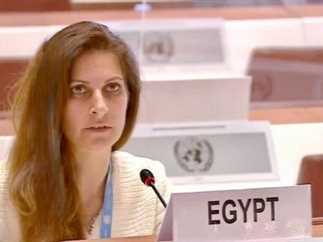
Ashraf AboArafe
Ambassador Ahmed Abu Zeid, the official spokesman and Director of the Public Diplomacy Department at the Egyptian Ministry of Foreign Affairs, stated that the Arab Republic of Egypt submitted an oral plea before the International Court of Justice in The Hague, on February 21, 2024, regarding the United Nations General Assembly’s resolution submitted to the International Court of Justice to request the granting of an advisory opinion to the Court. Regarding the legal consequences of Israeli practices in the occupied Palestinian territories since 1967, Dr. Yasmine Moussa, legal advisor in the office of the Minister of Foreign Affairs, presented the Egyptian plea before the court.
The pleading included legal defenses and supports to confirm the court’s jurisdiction to grant an advisory opinion on that issue, and from an objective standpoint to confirm the illegality of the systematic Israeli occupation practices against the legitimate and inalienable rights of the Palestinian people.
Ambassador Abu Zeid explained that Egypt emphasized, in its pleading before the court, the utmost importance of the legal dimensions resulting from granting the court’s advisory opinion regarding the situation in the occupied Palestinian territories, and that the request for an advisory opinion comes under a delicate circumstance, and against the background of a history extending for about seventy-five years of practice. The Israeli government aims to push the displacement of Palestinians from their lands, the dispossession of lands and homes, the implementation of policies of collective punishment, the systematic and indiscriminate use of violence against civilians, and the continued exposure of the Palestinian people to human suffering with an approach of unprecedented scale and impact, while the world still stands silent in the face of taking a firm stance on the inevitability of ending the long-term occupation. Term.
Egypt explained in the plea that it has become impossible to ignore the responsibility of international parties to change the status quo, as the Israeli attacks against the residents of the occupied Gaza Strip are still continuing, with the number of victims exceeding 29 thousand among the Palestinian people, and approximately 2.3 million people have been transferred and displaced. Forcibly, in flagrant violation of the provisions of international law, and in light of the Security Council’s inability to achieve an immediate ceasefire, noting that this catastrophic situation has extended to include the West Bank, where entire Palestinian communities have been displaced as a result of the escalation of Israeli settler violence, and restrictions have been placed on The movement of citizens, the implementation of punitive measures by demolishing homes, in addition to the expansion of the Israeli government’s policies in its settlement activities in a way that increases the separation between the Palestinian territories, threatens the foundations of international legitimacy’s decisions regarding the two-state solution, and even undermines the prospects for establishing lasting peace and coexistence among the peoples of the region.
The official spokesman for the Ministry of Foreign Affairs explained that the pleading focused on presenting legal arguments and arguments regarding four main topics, first – confirming the jurisdiction of the International Court of Justice to grant an advisory opinion on Israeli practices in the occupied Palestinian territories since 1967, and second – examining the legal implications resulting from the occupation. The Israeli government has long been in violation of the law of war and the principles governing the legality of the use of force, as well as the legal implications of the prohibition of seizing territory by force, the principle of the right to self-determination of peoples, the prohibition of racism and apartheid, and thirdly – refuting the legal justifications for using the principle of self-defense and the security necessity. Or military, and fourth – a summary of the legal implications arising from Israeli practices.
Ambassador Abu Zeid added that the Egyptian plea was based on the precedents of the court’s rulings and opinions, which confirm the application of international humanitarian law and international human rights law in the occupied Palestinian territories, as well as the principle of the illegality of annexing lands and seizing the territory by force, rejecting Israel’s practices of Judaizing Jerusalem, and condemning the violation of the right to The Palestinian people in self-determination, most notably the advisory opinion of the International Court of Justice regarding the separation wall in the occupied Palestinian territories. The Court’s positions also previously confirmed the applicability of the legal principles contained in the Charter of the United Nations and the Fourth Geneva Convention to the occupied Palestinian territories, as well as the Hague Rules on the Law and Customs of War, and treaties on international human rights law, especially the International Convention on the Elimination of All Forms of Racial Discrimination, in addition to the principles of international law. customary, and resolutions of the Security Council and the United Nations General Assembly.
Egypt has stressed that the jurisdiction of the International Court of Justice to grant an advisory opinion is indispensable in order to support the goal of the two-state solution to establish the foundations of security and stability in the region, and to reach a just, comprehensive, and lasting solution to the Arab-Israeli conflict based on the provisions of international law, stressing that the only way to achieve that The goal remains the establishment of a Palestinian state, with continuous and viable territory, on the pre-1967 lines, with East Jerusalem as its capital.
The Arab Republic of Egypt stressed the need for the international community to commit, in accordance with the principles of collective responsibility, to stop systematic Israeli violations of the provisions of international law, and not to recognize and reject any effects arising from illegal Israeli practices in the occupied Palestinian territories, whether in the Gaza Strip or the West Bank, including Jerusalem. Eastern Province, from settlement, displacement, land theft, and obstructing the Palestinian people from self-determination and establishing their independent state, stressing the need for international parties to put pressure on Israel to comply with the relevant decisions of international legitimacy, and to respect the provisions of international law, international humanitarian law, and the principles of the United Nations Charter.
The official spokesman for the Ministry of Foreign Affairs concluded his statements, revealing that the two written memorandums that Egypt submitted to the International Court of Justice in July and October 2023, in addition to the oral lever, which was prepared by the legal team of the Egyptian Ministry of Foreign Affairs, dealt extensively with the legal effects of Israeli practices in the Palestinian territories occupied since 1967, and aimed to confirm the court’s jurisdiction to consider the issue, and to prove the legal effects arising from Israeli practices within the framework of its obligations as a force. Occupation list.




